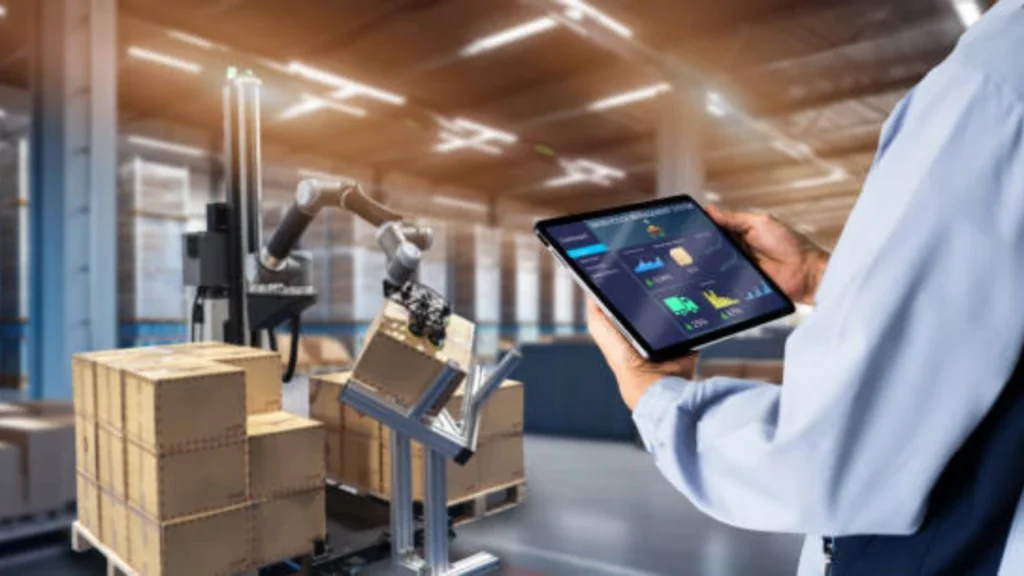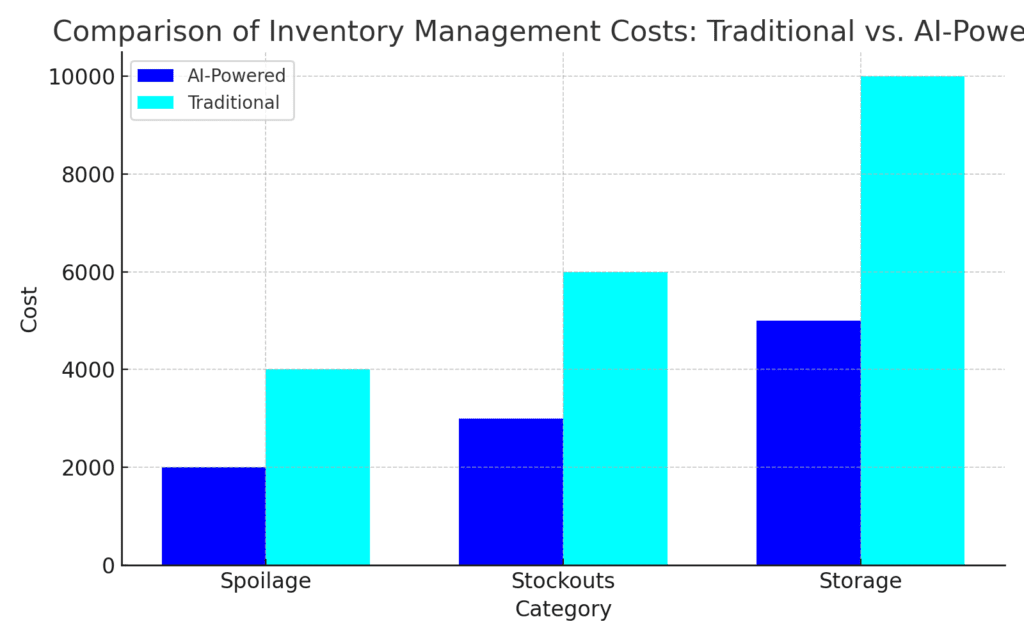Managing inventory can be a significant challenge for small businesses. Juggling stock levels, predicting demand, and minimizing waste are crucial for profitability, but traditional methods often fall short. That’s where AI-powered inventory management comes in. In 2024, AI will transform how small businesses handle their stock, offering powerful tools to streamline operations, reduce costs, and gain a competitive edge. This comprehensive guide explores the top AI inventory management software options available and how they can benefit your business.
The Growing Need for AI in Inventory Management:
Small businesses face unique inventory management challenges. Limited resources, fluctuating demand, and maintaining lean operations make accurate forecasting and efficient stock control essential. Traditional methods like spreadsheets or manual tracking are often inadequate, leading to:
- Stockouts: Running out of popular items, resulting in lost sales and dissatisfied customers.
- Overstocking: Holding excess inventory, tying up valuable capital, and increasing storage costs.
- Inaccurate Data: Manual data entry is prone to errors, leading to inaccurate inventory counts and poor decision-making.
- Inefficient Processes: Manual processes are time-consuming and labor-intensive, diverting resources from other critical business functions.
AI-powered inventory management software addresses these challenges by automating key processes, providing accurate insights, and optimizing stock levels in real time.10 Ways AI is Transforming Supply Chain Management: A Modern Approach
Key Benefits of AI Inventory Management Software for Small Businesses:
Implementing AI-driven solutions can bring significant benefits to small businesses:
- Precise Demand Forecasting: AI algorithms analyze historical sales data, seasonal trends, market fluctuations, and even external factors like weather patterns or social media trends to predict future demand with remarkable accuracy. This allows you to proactively adjust stock levels and avoid stockouts or overstocking. This is especially important for small businesses that operate with limited capital.
- Automated Stock Replenishment: Say goodbye to manual reordering. AI can automate the process of generating purchase orders when inventory levels reach predetermined thresholds. This ensures a continuous flow of stock without manual intervention. This automation improves efficiency and frees up valuable time for other business tasks.
- Optimized Stock Levels: AI constantly analyzes data to determine the ideal stock levels for each product, considering factors like lead times, demand fluctuations, and storage costs. This optimization minimizes carrying costs while ensuring you have enough inventory to meet customer demand. This is a critical factor for small businesses operating with limited storage space.
- Reduced Waste and Spoilage: For businesses dealing with perishable goods or products with expiration dates, AI can predict spoilage rates and optimize inventory turnover. This helps minimize waste and maximize profitability. This is a game-changer for businesses in the food and beverage, pharmaceutical, or fashion industries.
- (Eco-Note: Reducing spoilage and waste through optimized inventory management has a positive environmental impact by minimizing resource consumption and reducing landfill waste.)
- Enhanced Supply Chain Visibility: AI can provide end-to-end visibility across your supply chain, allowing you to track inventory in real time, identify potential bottlenecks, and optimize logistics. This enhanced visibility improves efficiency and reduces lead times.
- (Eco-Note: Optimizing logistics and reducing transportation needs through improved supply chain visibility can lower carbon emissions associated with shipping and delivery.)
- Improved Customer Satisfaction: By ensuring you always have the right products in stock, AI-powered inventory management can significantly improve customer satisfaction and loyalty. This is crucial for small businesses looking to build a strong customer base.


Top AI Inventory Management Software Options for Small Businesses in 2024:
Here’s a closer look at some of the top AI inventory management software options available for small businesses in 2024:
- Zoho Inventory: While not exclusively AI-driven, Zoho Inventory integrates with other Zoho apps and leverages AI for tasks like sales forecasting and reporting. It offers a user-friendly interface and a wide range of features, making it a good all-around solution for many small businesses. It’s a cost-effective option for businesses just starting with inventory management software.
- Cin7: Cin7 focuses on omnichannel inventory management, allowing businesses to manage inventory across multiple sales channels, including online marketplaces, e-commerce stores, and physical retail locations. It utilizes AI for demand forecasting, automation, and reporting, making it ideal for businesses with complex sales operations.
- Fishbowl Inventory: This platform is geared towards manufacturing and warehouse management, offering robust features for inventory control, manufacturing orders, and warehouse management. It leverages AI for demand planning, optimization, and production scheduling. It is a good choice for small businesses involved in manufacturing or distribution.
- DEAR Inventory: DEAR Inventory is a cloud-based solution that offers real-time inventory tracking, manufacturing management, and seamless integrations with accounting software. It uses AI for demand forecasting and generating insightful reports. It’s a scalable solution that can grow with your business.
- 10 Ways AI is Transforming Supply Chain Management: A Modern ApproachSortly
Here’s a comparison chart of the inventory management software based on the provided data:
Inventory Management Software Comparison
| Feature | Zoho Inventory | Cin7 | Fishbowl Inventory | DEAR Inventory | Sortly |
|---|---|---|---|---|---|
| Target Industry | General, E-commerce, Retail | Omnichannel Retail, E-commerce, Wholesale | Manufacturing, Warehousing, Distribution | Manufacturing, Wholesale, E-commerce | Small Businesses, Individuals |
| Key Features | Inventory tracking, Order management, Reporting, Integrations with Zoho apps, Sales Forecasting (AI-powered) | Omnichannel sales management, Demand forecasting (AI), Automation, Reporting | Inventory control, Manufacturing orders, Warehouse management, Demand Planning (AI) | Real-time inventory tracking, Manufacturing management, Accounting integrations, Demand Forecasting (AI) | Barcode scanning, Photo tracking, Custom reports, Mobile app |
| Pricing | Starts from $49/month | Starts from $299/month | Contact for pricing | Starts from $99/month | Starts from $29/month |
| AI Focus | Sales Forecasting, Reporting | Demand Forecasting, Automation | Demand Planning, Optimization | Demand Forecasting, Reporting | Basic Inventory Tracking, No Advanced AI |
| Best For | Businesses starting with inventory software | Businesses selling across multiple channels | Manufacturing and warehouse operations | Growing businesses needing scalability | Simple inventory tracking needs |
Note: Pricing information is as of late 2023. It’s recommended to check current pricing for the most up-to-date information.
Choosing the Right AI Inventory Management Software for Your Small Business:
Selecting the right software depends on your specific business needs and budget. Here are key factors to consider:
- Business Size and Industry: The ideal software for a small retail store will differ from that of a small manufacturing company.
- Key Features: Prioritize features like demand forecasting, automation, integrations with other business systems (e.g., accounting, e-commerce), and reporting capabilities.
- Budget: Consider upfront costs, monthly subscription fees, and potential implementation costs.
- Ease of Use and Implementation: Choose software that is intuitive and easy for your team to adopt. Look for providers that offer training and support.
- Scalability: Ensure the software can grow with your business as your inventory management needs become more complex.
10 Ways AI is Transforming Supply Chain Management: A Modern Approach

The Future of AI in Inventory Management:
AI is continuously evolving, and its impact on inventory management will only grow stronger. We can expect to see even more sophisticated AI-powered solutions in the future, with features like:
- Predictive Maintenance: AI can predict when equipment in warehouses or manufacturing facilities is likely to fail, allowing for proactive maintenance and preventing costly downtime.
- (Eco-Note: Predictive maintenance can contribute to sustainability by extending the lifespan of equipment and reducing the need for replacements, thereby minimizing resource consumption and waste.)
- Autonomous Warehouses: AI-powered robots and automation systems will further optimize warehouse operations, improving efficiency and reducing labor costs.
- (Eco-Note: Increased efficiencies in warehouses, such as optimized storage and movement of goods, can lead to reduced energy consumption and a smaller carbon footprint.)
- Personalized Customer Experiences: AI can analyze customer data to personalize product recommendations and optimize inventory to meet individual customer preferences.
Conclusion:
Top AI inventory management software for small businesses in 2024 offers a powerful way to optimize operations, reduce costs, and improve customer satisfaction. You can find the perfect solution to help your business thrive by carefully evaluating your needs and exploring the available options. Choosing the right AI inventory management software is key to ensuring your small business is ready for the future.
Disclaimer:
This article is for informational purposes only and does not constitute professional business or financial advice. The software solutions mentioned are examples and not endorsements. The suitability of any specific software will depend on individual business needs and circumstances. Conduct thorough research and potentially consult with a qualified professional before making any purchasing decisions.
